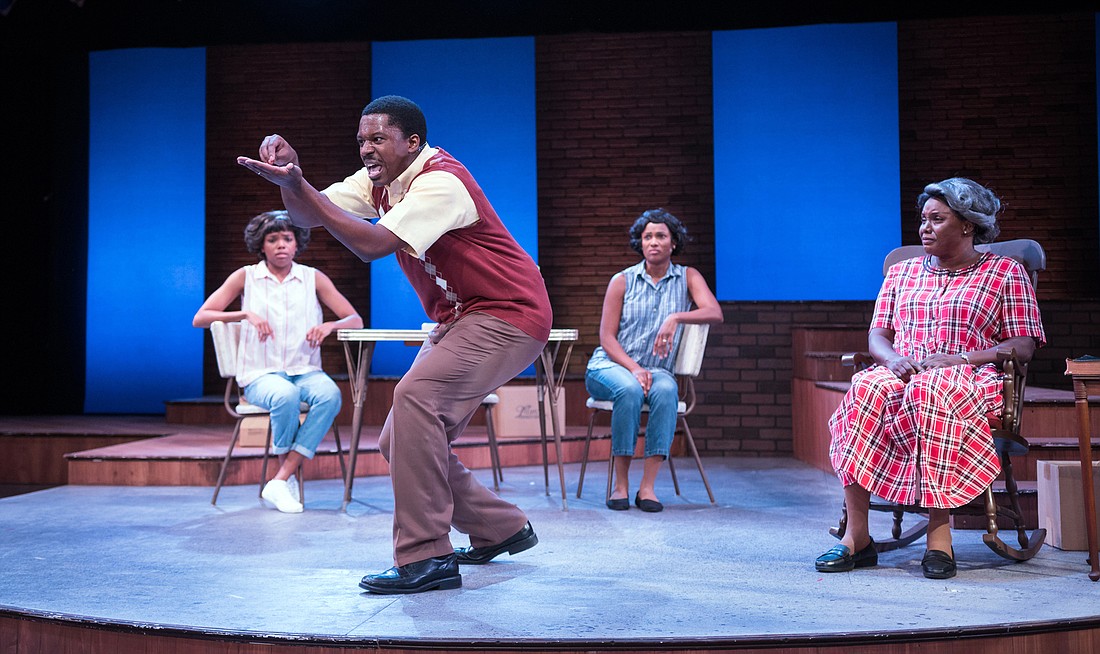- July 11, 2025
-
-
Loading

Loading

What happens to a dream deferred?
Does it dry up like a raisin in the sun?
Or fester like a sore —
And then run?
—from Langston Hughes’ “Harlem”
Lorraine Hansberry answered the poet’s question with her 1959 play, “A Raisin in the Sun.” “Raisin,” the Tony Award-winning 1973 musical adaptation, adds songs by Robert Brittan and Judd Woldin. Playwrights Robert Nemiroff and Charlotte Zaltzberg stay faithful to the original story.
It’s the tale of the Youngers, a struggling, black family living in the 1950s. Three generations of that family share a cramped, rat and roach-infested flat in the South Side of Chicago. Their dreams outgrew it a long time ago.
The churchgoing grandmother, Mama Lena (Jannie Jones), dreams of buying a decent house in a decent neighborhood, which in those days, meant white. Her daughter, Beneatha (Kiara Hines) dreams of being a doctor after struggling through medical school. Joseph Asagai (William Tipton), a Nigerian exchange student, dreams of winning her heart. Mama Lena’s son, Walter Lee (Brian L. Boyd), dreams of running his own business — and tossing his humiliating chauffeur’s cap in the trash. His wife, Ruth (JoAnna Ford), wants what’s best for him — but shares her mother-in-law’s dreams of moving on up. Walter and Ruth’s son, Travis, (Samuel Waite) dreams his parents would stop fighting about money.
Humble dreams. Then or now, they were nearly impossible dreams for African-American families living on the edge of poverty. But they’re in reach now for the Youngers, thanks to the death of the family patriarch. His $10,000 life insurance check is in the mail. Despite their sadness, the Youngers get their hopes up. But their dreams are deferred — as the Langston Hughes reference implies.
Hansberry’s original play packs an emotional punch. Would Broadway show tunes overpower its simple narrative? (I had a sinking feeling they would.) Happily, they don’t. Although the songs are full of power.
Musical director Brennan Stylez and his hard-driving band go full-throttle with the score. It’s an odyssey across the musical map, from the West African rhythms of “Alaiyo,” to the upbeat, gospel-inspired “He Come Down This Morning,” to the bluesy lament, “Measure the Valleys.” The songs work, because they flow from character. They’re X-Rays of heart, and don’t feel tacked on.
WBTT consistently punches above its weight. Director Jim Weaver keeps a steady eye on story and character — and makes the stage feel 10 times bigger with his fine choreography. (Michael Newton-Brown’s clever set design and Michael Pasquini’s lighting contribute to the effect.) It’s a stellar cast of actors who can sing, or singers who can act, depending on how you look at them. Either way, they always keep it real.
Hansberry’s heartbreaking, heartwarming story is the motor driving the musical. WBTT’s army of talent consistently serve that story, and not their egos. The tale of a struggling family is specific to the African-American experience, but also universal.
The love of money is the root of all sorts of evil. You could say the same thing about the lack of money.
We can all relate.